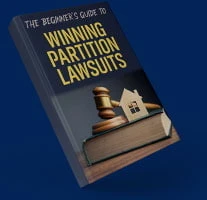The California Partition Law begins at Code of Civil Procedure section 872.010 with definitions. These definitions apply throughout the entirety of the Partition Law, which ends only at Code of Civil Procedure section 874.323. The point of this statute is to provide uniformity throughout the Partition Law and reduce any uncertainty about the meaning of any terms so that the law may be applied without any debt.
Code of Civil Procedure section 872.010 states
As used in this title:
(Amended by Stats. 1979, Ch. 730.)
For example, “Julie” bought a house with her boyfriend, “Shawn,” thinking that they would get married one day. Later, after they had bought the house, Julie realized that her boyfriend was not the right person for her. Because Julie wanted to move on in her life, she also wanted to sell the house she bought with her boyfriend. Her boyfriend, however, was mad at Julie for breaking up with him, and so refused to agree to sell the house. Because they were not married, Julie could not go to a divorce lawyer, and because they both did not agree to sell, a realtor could not help Julie. Julie felt trapped. Julie then, however, found a partition lawyer, who was able to file a “partition action” within the meaning of Code of Civil Procedure section 872.010, subdivision (a), and was able to get the house sold so she could move on with her life. A partition lawyer got the job done.Law Revision Commission Comments (CCP § 872.010)
1976 Addition
Section 872.010 provides definitions for terms used in this title.
The term “lien” is defined broadly in subdivision (c) to apply to any encumbrance on property, including security interests in personal property.
The term “title report” in subdivision (f) is drawn using the terminology employed in the title insurance industry.
1979 Amendment
Section 872.010 is amended to delete subdivision (b) (“guardian” includes conservator) as unnecessary. The term “guardian” is used in Sections 873.040and 873.690, and those sections are amended to include specific references to a conservator. Subdivisions (c) through (f) of Section 872.010 are redesignated as subdivisions (b) through (e), respectively.
In order to indicate more fully its intent with respect to Assembly Bill 1671, the Assembly Committee on Judiciary made a report. Except for other comments contained under various sections of Assembly Bill 1671 as set out in Recommendation of the California Law Revision Commission Relating to Partition of Real and Personal Property (January 1975), 13 Cal. L. Revision Comm’n Reports 401 (1975), reflect the intent of the Assembly Committee on Judiciary in approving the various provisions of Assembly Bill 1671.
Assembly Bill 1671 was a comprehensive revision of the law relating to partition of real and personal property. The bill embodies recommendations of the California Law Revision Commission. The Commission’s consultant for the partition study was Mr. Garrett Elmore, a practicing attorney who had experience as a partition referee and who, for many years, was counsel to the State Bar Committee on the Administration of Justice.
The prior title of the Code of Civil Procedure containing the partition remedy was enacted in 1872 and contained a great deal of obsolete material. In addition, there were gaps and ambiguities in the procedural detail of the existing law. These defects contributed to the decline of partition as a useful remedy.
Assembly Bill 1671 was designed to fill in gaps, clarify ambiguities, and modernize the partition remedy.
The statute governing actions for partitions of real and personal property was enacted in 1872 and has remained basically unchanged since. Many sections of the statute were obsolete. Some were unduly lengthy or dealt with several subjects Their order was often haphazard. A few duplicate matters that were handled more adequately by general provisions of law governing civil actions. Nearly all of it contained archaic or obscure language.
For these reasons, the Law Revision Commission recommends that the partition statute be reorganized, revised, and modernized. In addition, reforms of partition procedure of a more substantive character are desirable.
Here at Underwood Law Firm, our knowledgeable attorneys are here to help navigate the complex web of case law and statutes surrounding partitions. If you are trying to plan a partition order, or just have any questions, please do not hesitate to reach out to our office.
